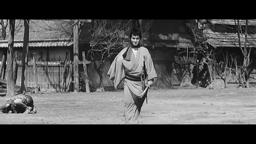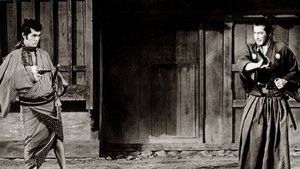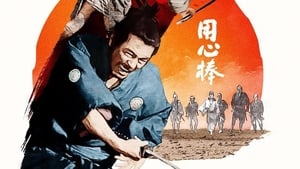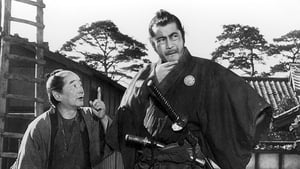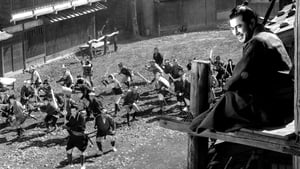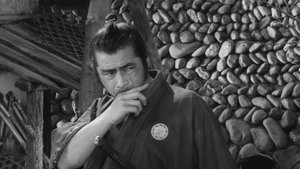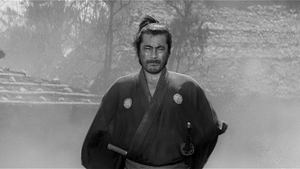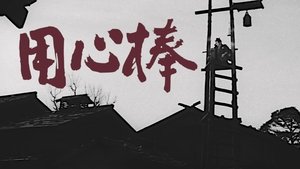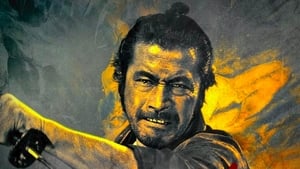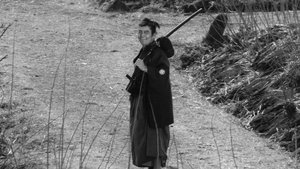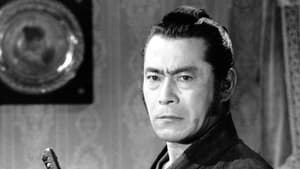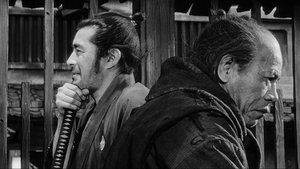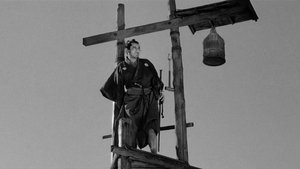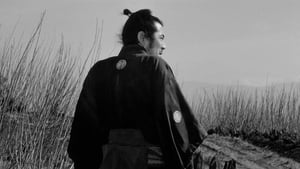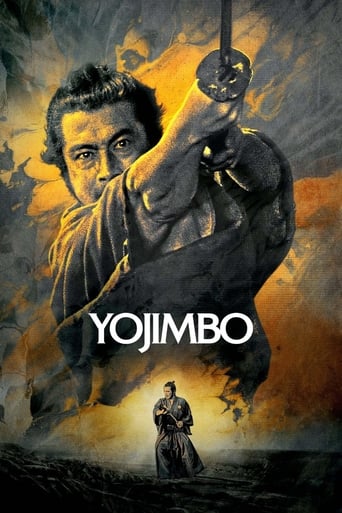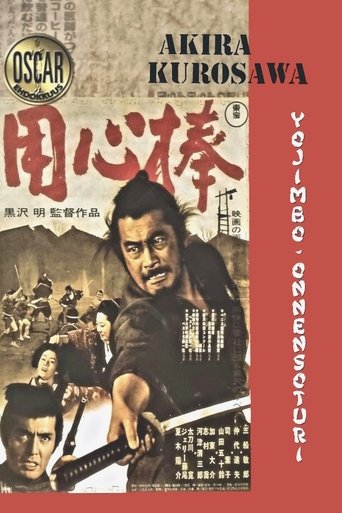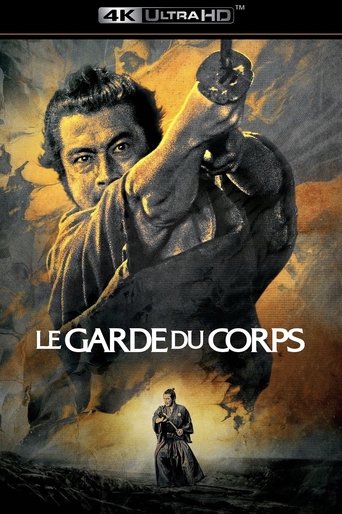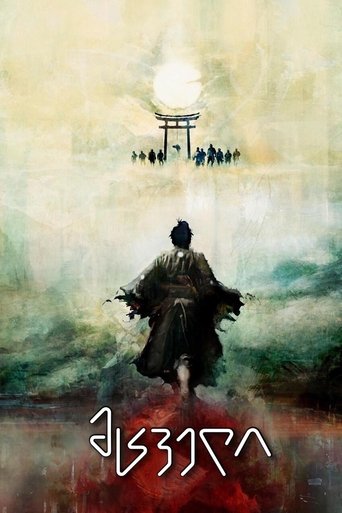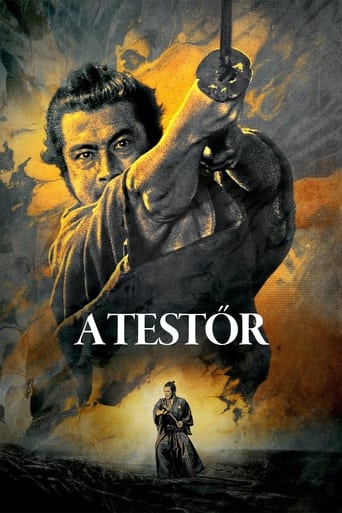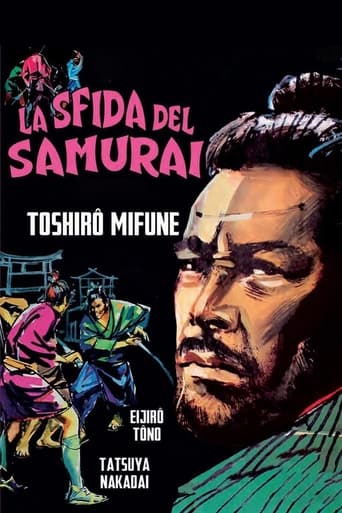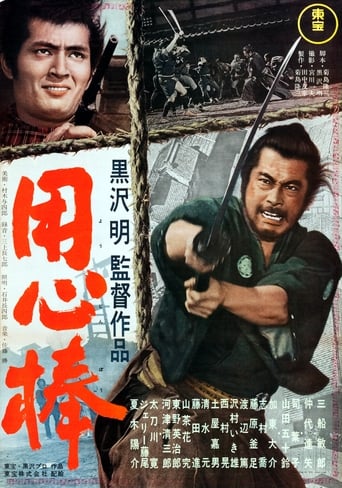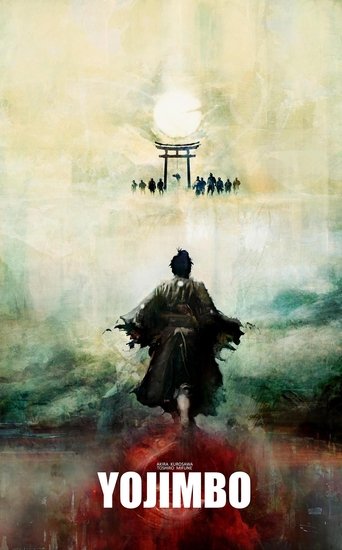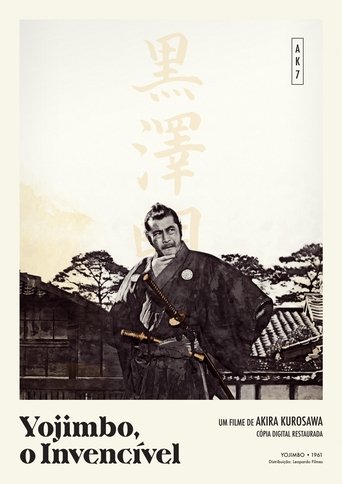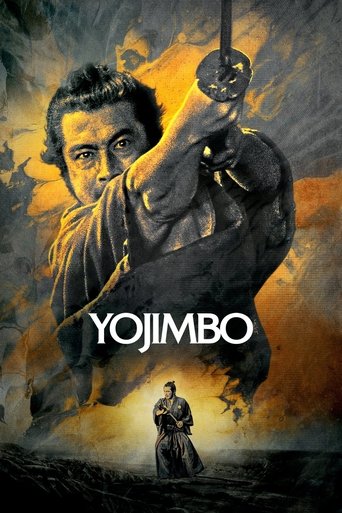
Yojimbo
Kill one or a hundred... you only hang once
1961 | 110m | Japanese
Popularity: 2 (history)
| Director: | Akira Kurosawa |
|---|---|
| Writer: | Akira Kurosawa, Ryuzo Kikushima |
| Staring: |
| A nameless ronin, or samurai with no master, enters a small village in feudal Japan where two rival businessmen are struggling for control of the local gambling trade. Taking the name Sanjuro Kuwabatake, the ronin convinces both silk merchant Tazaemon and sake merchant Tokuemon to hire him as a personal bodyguard, then artfully sets in motion a full-scale gang war between the two ambitious and unscrupulous men. | |
| Release Date: | Apr 25, 1961 |
|---|---|
| Director: | Akira Kurosawa |
| Writer: | Akira Kurosawa, Ryuzo Kikushima |
| Genres: | |
| Keywords | japan, gambling, samurai, sword, bodyguard, fighting, intrigue, ronin, jidaigeki, revolver, edo period, feudal japan, business rivalry, middleman, asian western, rivals, pitting ones enemy's against each other |
| Production Companies | TOHO |
| Box Office |
Revenue: $0
Budget: $0 |
| Updates |
Updated: Sep 30, 2025 Entered: Sep 30, 2025 |
| Name | Character |
|---|---|
| Toshirō Mifune | Sanjuro Kuwabatake / The Samurai |
| Tatsuya Nakadai | Unosuke, gunfighter |
| Yōko Tsukasa | Nui |
| Isuzu Yamada | Orin |
| Daisuke Katō | Inokichi |
| Seizaburō Kawazu | Seibê - brothel operator |
| Takashi Shimura | Tokuemon, sake brewer |
| Hiroshi Tachikawa | Yoichiro |
| Yōsuke Natsuki | Kohei's Son |
| Eijirō Tōno | Gonji, Tavern Keeper |
| Kamatari Fujiwara | Tazaemon |
| Ikio Sawamura | Hansuke |
| Atsushi Watanabe | The Cooper (Coffin-Maker) |
| Susumu Fujita | Homma, Instructor Who Skips Town |
| Kyū Sazanka | Ushitora |
| Kō Nishimura | Kuma |
| Takeshi Katō | Ronin Kobuhachi |
| Ichirō Nakatani | First Samurai |
| Sachio Sakai | First Foot Soldier |
| Akira Tani | Kame |
| Namigoro Rashomon | Kannuki the Giant |
| Yoshio Tsuchiya | Kohei |
| Gen Shimizu | Magotaro |
| Jerry Fujio | Roku - Samurai Whose Arm is Cut |
| Yutaka Sada | Matsukichi |
| Shin Ōtomo | Kumosuke |
| Shōichi Hirose | Ushitora Follower |
| Hideyo Amamoto | Yahachi |
| Shōji Ōki | Sukeju |
| Fuminori Ōhashi | Second Samurai |
| Hiroshi Kiyama | Farmer |
| Senkichi Ōmura | Traveler |
| Noriko Honma | Farmer's Ex-wife |
| Ryusuke Nishio | Seibei Follower |
| Naoya Kusakawa | Seibei Follower |
| Nadao Kirino | Seibei Follower |
| Mitsuo Tsuda | |
| Shinpei Takagi | Ushitora Follower |
| Jun Ōtomo | Seibei Follower |
| Akio Kusama | Ushitora Follower |
| Yasuzō Ogawa | Ushitora Follower |
| Hiroshi Takagi | Ushitora Follower |
| Jun'ichirō Mukai | Seibei Follower |
| Takuzō Kumagai | |
| Ichirō Chiba | Second Foot Soldier |
| Haruya Sakamoto | Ushitora Follower |
| Rinsaku Ogata | Seibei Follower |
| Takeo Ogushi | Ushitora Follower |
| Yoko Terui | Woman at Seibei's House |
| Hiromi Mineoka | Woman at Seibei's House |
| Michiko Kawa | Woman at Seibei's House |
| Name | Job |
|---|---|
| Masanobu Miyazaki | Sound Mixer |
| Hisashi Shimonaga | Sound Recordist |
| Junjirō Yamada | Hairstylist |
| Kazuo Miyagawa | Director of Photography |
| Teruyo Nogami | Script Supervisor |
| Masaru Satō | Original Music Composer |
| Akira Kurosawa | Screenplay, Director, Editor |
| Yoshirō Muraki | Costume Design, Production Design |
| Ryū Kuze | Choreographer |
| Takao Saitō | First Assistant Camera |
| Ichirô Minawa | Sound Effects Editor |
| Kôichi Hamamura | Property Master |
| Hiroshi Nezu | Production Supervisor |
| Shirō Moritani | Assistant Director |
| Chôshichirô Mikami | Sound Recordist |
| Yoshiko Matsumoto | Hairstylist |
| Ryuzo Kikushima | Screenplay |
| Reiko Kaneko | Editorial Production Assistant |
| Masanobu Deme | Assistant Director |
| Yoshifumi Honda | Assistant Art Director |
| Chōshirō Ishii | Lighting Technician |
| Daisaku Kimura | Focus Puller |
| Name | Title |
|---|---|
| Ryuzo Kikushima | Executive Producer |
| Akira Kurosawa | Producer |
| Tomoyuki Tanaka | Executive Producer |
| Organization | Category | Person |
|---|
Popularity History
| Year | Month | Avg | Max | Min |
|---|---|---|---|---|
| 2024 | 4 | 22 | 30 | 15 |
| 2024 | 5 | 26 | 37 | 17 |
| 2024 | 6 | 21 | 35 | 15 |
| 2024 | 7 | 30 | 52 | 18 |
| 2024 | 8 | 26 | 52 | 15 |
| 2024 | 9 | 19 | 32 | 11 |
| 2024 | 10 | 21 | 32 | 14 |
| 2024 | 11 | 18 | 26 | 13 |
| 2024 | 12 | 23 | 31 | 17 |
| 2025 | 1 | 21 | 30 | 15 |
| 2025 | 2 | 14 | 20 | 3 |
| 2025 | 3 | 7 | 22 | 2 |
| 2025 | 4 | 3 | 4 | 2 |
| 2025 | 5 | 2 | 3 | 2 |
| 2025 | 6 | 3 | 5 | 2 |
| 2025 | 7 | 3 | 5 | 2 |
| 2025 | 8 | 3 | 4 | 2 |
| 2025 | 9 | 4 | 5 | 3 |
| 2025 | 10 | 4 | 6 | 3 |
| 2025 | 11 | 4 | 9 | 2 |
| 2025 | 12 | 4 | 7 | 2 |
| 2026 | 1 | 3 | 4 | 2 |
| 2026 | 2 | 3 | 5 | 2 |
Trending Position
| Year | Month | High | Avg |
|---|---|---|---|
| 2025 | 10 | 753 | 880 |
| Year | Month | High | Avg |
|---|---|---|---|
| 2025 | 9 | 353 | 359 |
Great movie! Akira Kurosawa is just a master movie maker. ...
Akira Kurosawa's 1961 film YOJIMBO is a Japanese period drama where wily strategy is worth just as much as prowess with a sword. In the late Edo era (some decades before its end in 1868) a community is plagued by two opposing gangs who have built up a criminal empire of prostitution and gambling. Ev ... en the local officials are on the take. Into this town steps a nameless samurai (Toshiro Mifune). Once they get a taste of his swordsmanship, both sides want to hire him, but he decides to play them off against each other and free the innocent citizens from this evil. In past films Kurosawa had taken advantage of Mifune's ability to produce exaggerated facial expressions of laughter and fear. Here, however, the nameless samurai is completely unflappable, while it is the criminal bosses and corrupt officials who play the clowns. Ikio Sawamura is a town constable constantly toadying to the gangsters, for example, while Isuzu Yamada gives a memorably sassy performance as the madame of a brothel. In what would become a convention of the Japanese period drama, the numerous henchmen in the gangs were apparently chosen from the most grotesque men that Kurosawa could find (each furthermore has distinctively ratty attire), and one thug is played by an actor suffering from gigantism. That darkly comedic drama between the characters coexists with brutal violence. Yet, while audiences may have been shocked in 1961 by the samurai dispatching his opponents with realistic slashing sound effects and a hacked off limb, there are only a handful of fights here, and they are all over in a flash. (Indeed, one of the most striking aspects of Mifune's acting is his speed in executing the sword moves.) While Kurosawa delights in gangsters getting their comeuppance, he doesn't revel in gore. Much has been said about how this Japanese film would inspire Westerns made in America and Europe (Sergio Leone's A FISTFUL OF DOLLARS was a straight-up remake). However, the film is also interesting for how it draws so much on influences from the West. Kurosawa's inspiration was an American crime caper by Dashiell Hammett, the samurai’s walk down the main street is drawn from the Westerns of John Ford and others, the soundtrack mixes Japanese music with Western instruments such as harpsichord, and Tatsuya Nakadai's pretty-boy looks are clearly modeled on Hollywood. All in all, I was very impressed by this film. Everything here – from the script and aspect to little things like the wind and dust and the little decorations on the set – seems the result of great effort and talent, all coming together to impress the viewer. And like Kurosawa's RASHOMON, it stays fresh even as its elements have been repeatedly reused by other film and television productions for half a century now.
I was surprised when I saw this, how late it was set - 19th Century - as I'd always imagined it to be of a more historical nature. That doesn't remotely detract from the story though - as again Kurosawa casts Yoshirô Mifune ("Sanjûrô") in the leading role. Here he is a wandering samurai who arrives ... in a village torn by strife. His skills are sought by the two opposing headmen and he quite successfully manages to play them off against each other - and keep the peace - until one the their sons arrives, armed with a pistol, and completely alters the balance of power. Mifune is superb as the maverick, thoroughly honourable and at times quite amusing ronin - I was reminded a little of the characterisation by Clint Eastwood in the Sergio Leone films - with a ruthless, violent streak: but somehow only towards those meritorious of their fate. It takes it's time, this - there is a fair degree of character development and as such, I felt quite invested in both Mifune and in his friend the innkeeper (Eijirô Tôno) as their peril gradually increases. The remainder of the cast adds to the tension well as does the frequent use of the weather in helping create the gripping atmosphere making this a corker of a film, very much worth watching.

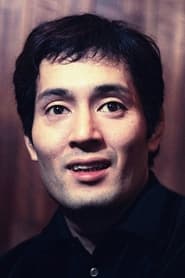
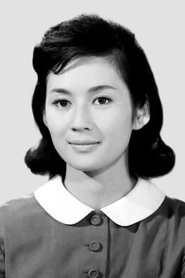
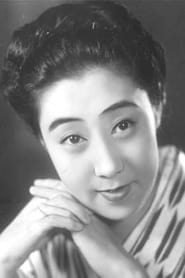
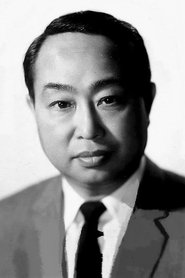
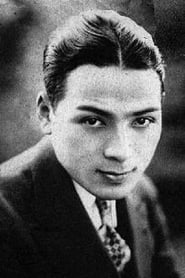
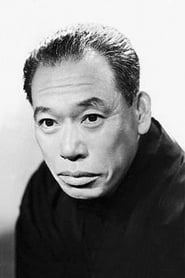
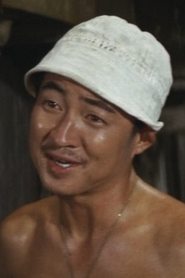

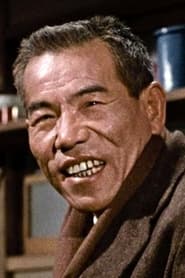
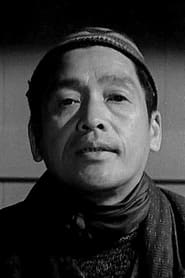
![Yojimbo (1961) Original Trailer [4K]](/extra_thumbs/nazk6Zpm_Ks.jpg)
